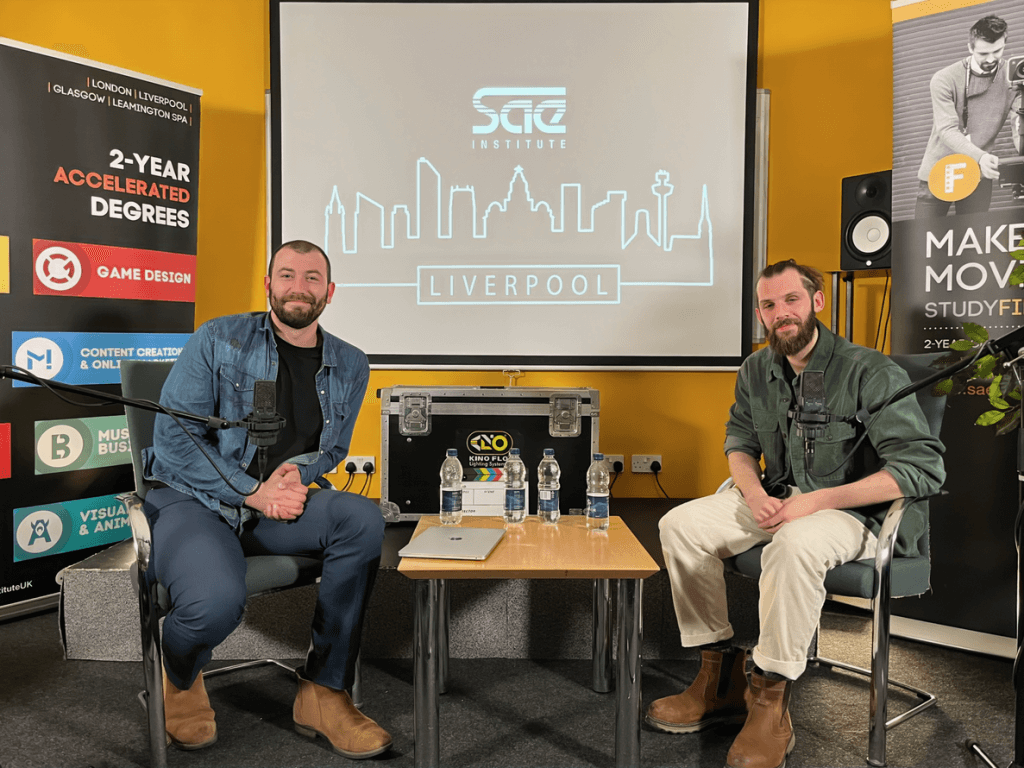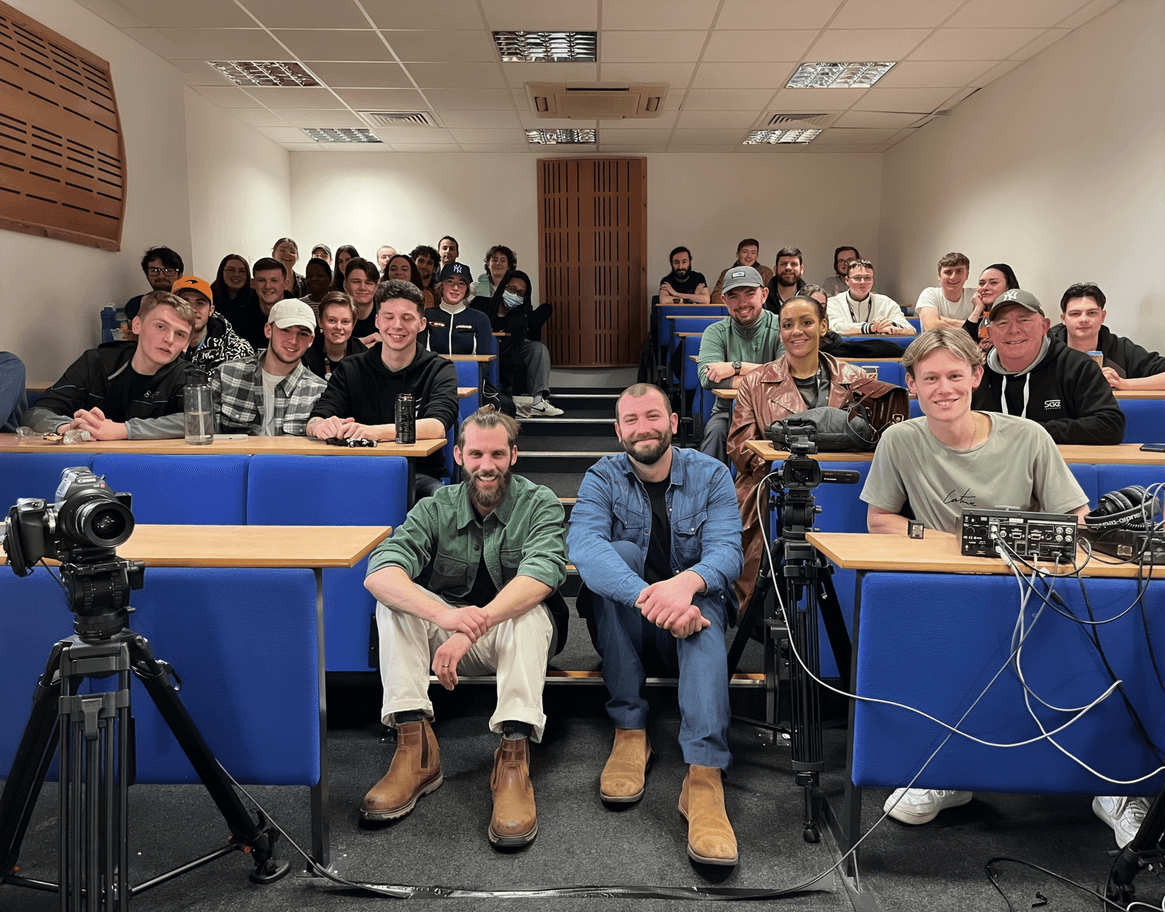SAE Liverpool students recently welcomed Oscar-winning Director and Actor Chris Overton to discuss the success of his film, The Silent Child, alongside tips for filmmaking success as part of a Q&A with SAE Tutor, Richard Weston.
Chris’ love for film started when he was a teenager, and he managed to land himself his first video camera. Ever since, Chris has been immersed in the world of film, from acting, producing and now heading up his own company, Slick Films.
The Silent Child is directed by Chris and written by and starring his wife Rachel Shenton. It tells the story of Libby, a deaf six-year-old girl, who lives a silent life until a social worker, played by Rachel, teaches her how to communicate through sign language.
The film won the Oscar for Live Action Short Film at the 90th Academy Awards in 2018.
Chris’ visit to our Liverpool campus was an inspiring session and we’ve compiled some essential pieces of advice that he was generous enough to share with our students in this blog. We hope you find some insights here to help you on your journey within the world of film.
If you’re interested in learning more about our Film Production course, then get in touch with SAE now.
Love the script and the project
When selecting a project to work on, I have to really feel something to want to get involved with it. This is what we say at Slick Films; “If it’s not a ‘hell yes’, it’s a no.”
This is because you can get pulled in many different directions in this industry, there are many scripts that I read but just don’t quite offer the magic.
It has to feel right because it’s so hard to get short films off the ground independently, you can live with a project for three or four years and invest so much time, energy and effort into it. With full feature films, it’s even trickier. I spoke to someone recently who has been developing something since 2009. So make sure you feel that it has to be worth doing.
Hire different people for different projects
If you look at big directors, they often work with the same people for their film projects. As great as it can be to establish successful partnerships, it can also be good to have more potential team members at your disposal. Sometimes your preferred colleagues aren’t available, they might be busy on something else, schedules might not align. Working with different people gives you greater flexibility and a wider resource of talent and expertise to draw on.
It’s not enough to just make a good film anymore
There’s so much more that goes with filmmaking besides just making a film. You have to appreciate that there can be a big gap between a picture being locked in and its screening to a public audience.
This means you have to work on how you build up an audience, consider what you can share in advance to stoke up interest and how best to grow anticipation for a film’s release. There’s a lot to it beyond just making it.
Follow your heart as a filmmaker
As directors and filmmakers, I feel that following your heart is essential in how you develop your voice. It can be hard to talk from the heart with authenticity if you’re not doing something you love. For me, I really have to feel an emotional connection with something to make a project work and turn it into a film.
Just do it
It’s tough to get going at the start, but I think there are many different pieces of advice to help you on your way.
‘Just do it’ is so common to say and you hear a lot as a piece of advice – but what does it mean when we break it down?
To me, it means don’t wait for everything to be totally perfect before you go out there and film something. This scenario may never come along. We also all have cameras in our phones now so there are less obstacles to getting out there and at least practising your film skills.

Networking is important
I was closed off from networking for years as I didn’t understand the benefits. And I know that the idea can be a bit intimidating for people.
It really should be called socialising. If you have a passion for film and like to talk to people who have the same passion, that’s networking, although sharing your enthusiasm and interests is just getting to know someone. Realising the benefits of that has been really important.
Festivals are great for this. When we did The Silent Child, we were clueless, we’d go, watch our own film and leave and this is what we kept doing. Instead, you need to go, watch other films and chat to filmmakers. These events are golden opportunities for building up networks.
It doesn’t have to be an instant connection with someone either. It could be months later or two years down the line where that relationship comes in. Ultimately, just trying to get on with people is good for you.
Work out what you want your film to be – and use this to inform your festival strategy
Getting your film into festivals is a challenge, especially with the bigger events, they must have so many email applications to wade through.
It can be expensive too, but on average it’s a one in 10 hit rate. If you submit to 50 festivals, you might get into five, if you submit to 15, you might get into one.
So you need to ask yourself, what’s the goal of the film? If you just want to make something you’re proud of, do a screening for cast and crew and show your parents – then all good. You know what your goal is.
However, for most people, you want the widest possible audience to see it. If you do want this, then you need a festival budget to get together.
Share a vision for success
I became a director as soon as I read the script for The Silent Child. Until then, I loved every element of filmmaking but I wasn’t brave enough to direct on my own. It was this script that lit a fire within me, this burning desire to tell this story.
Everyone in the crew had something to prove as individuals too, we all wanted to step up and do something that meant something. We were all really in sync and it was that shared sense of ambition that pushed it forward.
It’s a hard recipe to find. But the timing was perfect for us when we made The Silent Child. If we’d tried to make it six months later, it might not have happened in the same successful way.
Taking on different roles makes you a better director
For me, I owe a lot of my career to doing actor showreels. That’s where it all started really. I started Slick Films to support my acting career, I then fell out of love with acting, fell more in love with filmmaking, often using two crew, and two actors. That was my film school in a sense.
I had 10 years of this, making mistakes and learning. But I think a range of experiences can be really good for you as a filmmaker, it gives you empathy for everyone involved in bringing a film to life. And ultimately, makes you a better director as you know how to get a better performance out of someone if you’ve been in their shoes.
Best ways to pitch
With pitching, one of the best pieces of advice is to avoid telling the story, instead focus on the journey of the protagonist or main character. This is more exciting than just discussing what happens.
To prepare, I often write my pitch down, then record myself going through it, listening to it on headphones so it’s ingrained in me. I’ve found this a really useful way of preparing, almost like learning lines as an actor.
Funding
I feel that aspiring filmmakers need to look at multiple routes of funding. Of course, there is the BFI who must be deluged with submissions and crowdfunding is also an option.
I’ve also put my own finances into a project. I’ve sat on panels at events where people have said never use your own money. But should you do that if you feel really passionately about getting something made? And there’s no other option? If you want to make something happen, then it’s something you need to consider.
Frugal budget foster creativity
On a small budget, you value every pound, and there’s a resourcefulness that comes in when you only have a limited amount of financial resources. I love to see that and think it’s bonkers that any short film gets made for more than £100k. You hear about it. But on a tighter budget, every bit of money means something more and you use it more wisely.
Thanks again to Chris for such a great masterclass.
Visit slickfilms.co.uk to find out more about his work with Rachel.
STUDY FILM Production at SAE
If you want to work in film production in the film industry, get to grips with the latest video editing software and hone your skills in a uniquely collaborative environment, then our Film Production degree could be for you.
With high-end digital cinema cameras and production suites, our facilities and expert tutors are well placed to give your career the best possible start in this fast-paced and dynamic industry.


































